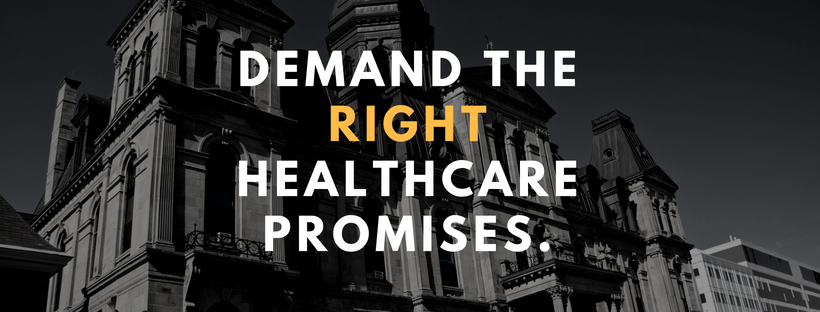 Last week, we wrote about the governance problems that plague our healthcare system. Our healthcare system isn’t underfunded— it is under-organized, under-planned , and inappropriately governed.
Last week, we wrote about the governance problems that plague our healthcare system. Our healthcare system isn’t underfunded— it is under-organized, under-planned , and inappropriately governed.
Promising long-term planning and apolitical qualified leadership in healthcare doesn’t make for sexy political sound bites or campaign promises. “More doctors and nurses” is much easier to tweet .
We don’t have the money or the time to tolerate politicians of any stripe playing with taxpayer money to craft politically advantageous promises that don’t move the dial forward for the long-term.
Above all else, we must demand responsible public spending in all facets of the public sphere, but especially in healthcare. That means all public spending must be judged not just on the short-term benefits but also the long-term impact on the province’s welfare.
We would be naïve to think that political parties won’t make promises related to healthcare. So here’s a few items that we’d like to see in platform documents that would result in both short and long-term benefits for our system.
Start with a plan
New Brunswick needs what it has never had— a plan for health and long-term care that relies on a clear, compelling patient-centered vision and sets realistic expectations. And we shouldn’t have to wait longer than three months for this plan— the basics are already there. This plan should outline how to ensure sensible system resource use and performance standards at all levels of care.
As long as Health and Long Term Care remain in separate governmental departments, we can’t develop an effective plan. Merging those two areas is the precursor to the plan.
Worship at the altar of primary care, not hospitals
Go to any corner of the province you’ll hear talk about the “glory days” of healthcare when we had over 50 hospitals. Yet, women and infants regularly died in childbirth, what are today’s day surgeries had double-digit mortality rates, most of us were dead by 70, and we knew virtually nothing about cardiovascular disease, one of our most common chronic ailments.
Medical technology and knowledge have expanded exponentially. But with that comes the reality that to effectively deliver the services that have added more than a decade to our life expectancy since the 1950s, we need critical mass and specialists. Gone are the days when a generalist performed every surgery under the sun and looked after every patient in the hospital, no matter what the disease.
We know patients are safer, healthier, and experience less complications when cared for by teams that regularly practice their skills, with the proper range of services to deal with medical emergencies. That can only happen in hospitals with sufficient patient volume. Even the Saint John Regional Hospital (our largest) doesn’t have sufficient volume of procedures and patients to easily recruit specialists.
If we really cared about using our healthcare dollars to become healthier, we would be shouting from the rooftops for improvements to the services that keep us out of the hospital in the first place. Prevention saves more lives (and resources) than any therapy in modern medicine. We should all be demanding that government works closely with the New Brunswick Medical Society and the Nurses Association to bring about accelerated introduction of comprehensive family health teams and community health centres throughout the province.
Emergency Rooms are for emergencies
We are chronic over users of emergency rooms in New Brunswick. This is cultural phenomena likely caused by perpetual deficiency in access to after hours primary care and a plethora of hospitals. We need to require primary care practice groups to offer after-hours office access as part of their service contracts. We also need to establish hospital-based urgent care centres to take the load of emergency rooms.
Government needs to fast-track the implementation and recruitment of advance care paramedics in New Brunswick, particularly for rural communities located more than 40km from a regional hospital.
Break down the silos with information sharing networks
Communication and information sharing always results in better healthcare for patients. Yet we continue to maintain separate turfs and silos in healthcare in New Brunswick. Patients in Northern New Brunswick have very little knowledge of the services available in Moncton or Saint John, even though facilities in those two cities serve the entire province. Healthcare providers in the urban centres around the province don’t talk to each other or learn from each other.
People will always fear and fight change when they have little understanding of the alternative. This applies to providers and patients alike. There is no single source that provides a province-wide picture of OUR healthcare assets and services around the province. A comprehensive patient, provider and service information network would make the sharing of vital information more effective. For instance, if you need to know who has the best treatment for irritable bowel syndrome in the province, where would you go now? Services in the province will improve remarkably when we get better at sharing and integrating information And this will be best done with organizing specialty services on a provincial Centre of Excellence basis.
Demand a rural healthcare plan
New Brunswick is urbanizing, albeit slowly. And perhaps this is why successive governments have failed to deliver an effective plan for rural healthcare. The strategy to date has been to wait out the rural population.
But we will always have a rural population in this province so long as our economy remains dependent on our natural resources. We need to properly address rural healthcare needs in a comprehensive, realistic, and sustainable way. By organizing services through a rural health strategy, it is possible to provide great health care services to people living away from regional centres.
We need to be cynical about healthcare promises in this coming election. Healthcare management is a complex field that requires specialized knowledge, training and experience. Running for office or working in politics does not qualify someone to manage our healthcare system and promise fixes. Be wary of promises that aren’t endorsed by experienced and knowledgeable healthcare managers, practitioners, and policy specialists. They aren’t worth the paper they’re written on and will only cost us more money in the long run.
